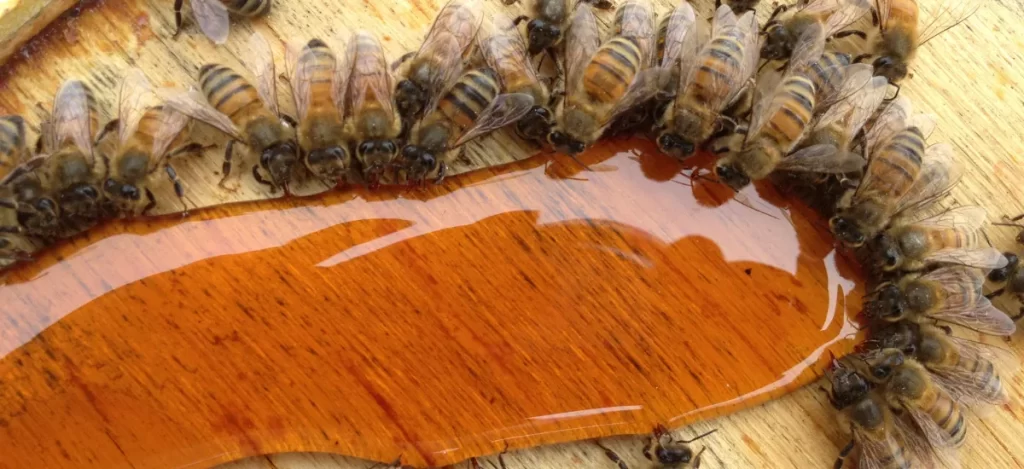Bees generally like it to be really winter when it’s winter. What does this mean? Bees find it much harder to tolerate temperature variations, where one day outside temperature is -2 and the next day 12 or 15 degrees. As the temperature rises, the bees start to come out of the hive, but they have nothing to do outside, they can’t look for pollen, they can’t find nectar, so it’s better for them to have winter in the full sense of the word.
If enough honey and fermented pollen are left, additional feeding of bees in winter will not be necessary. With the appearance of pollen, bees will have enough food in early March.
However, when the beekeeper estimates that there is not enough food in the hives, for whatever the reason, it is quite a logical solution to help the bees by providing additional food.

What Food Consumption Depends On?
The bee community consumes very little food in the first months of winter, and does not consume pollen at all at that time. Food consumption depends on the strength of the community. Bees in a larger winter hive use less energy to generate heat than bees in a smaller hive. Therefore, a strong community consumes relatively less food than a weaker one.
Communities exposed to disturbances and sudden changes in temperature consume more food. The bees consume more food before the end of winter, in the period when the queen in the center of the hive begins to lay eggs, so the bees have to feed the brood.
Theoretically, food consumption is not difficult to predict if it is known that one bee consumes up to 2 milligrams of food a day, even less, in the period until the appearance of a new brood. If the community consists of twenty thousand bees, that means that the daily consumption is about 40 grams or about 1.2 kilograms per month. Since the number of bees varies, about 5 kilograms of food will be consumed by the beginning of February.
How Much Honey Should Be Left For The Bees For The Winter?
Bees remain active throughout the winter. One of the most important issues related to bee wintering planning is the question of how much honey bees leave for the winter.
Bees should be left with as much honey for the winter, with some pollen, as they need until a safe spring grazing. That amount of honey depends on the strength of the bee community and on the climatic and grazing conditions of each region.
Bees are usually left with about 15 kg of honey during the wintering period. For strong bee communities, in the area with late spring grazing, a larger amount (20 to 25 kg) is also recommended. Therefore, the honeycomb frame must be so large that a ball with a diameter of some 25 cm can be placed on it, as well as the amount of honey of approximately 2 kg, which is about 12 dm2.
In the hives of a conscientious beekeeper that prefers not to squeeze all the honey the bees brought in at the end of the summer, the supplies will surely be sufficient until the first entries.
Additional Feeding Of Bees In Winter – Tips For Feeding
Man takes their stored food from the bees for his own needs, so there is a need to feed the bees, i.e. to provide replacement food.
Taking a moderate amount of honey does not bother bees, as a rule, but the practice that some beekeepers carelessly do can be the cause of starvation of the entire community.
Naturally, this can be easily prevented by supplementary feeding in case the beekeeper notices that the bees are lacking a sufficient supply of food.
Before I list what replacement food bees need to survive, I feel the need to write about what to avoid if you decide to feed bees in the winter and what can lead to major problems and deaths.
First of all, bees should be given honey produced by other communities. Although it will not harm humans, pathogens that may be present in honey can decimate bees that are not resistant to such infectious organisms. Bees can only be given honey that they have produced themselves.
Fructose-glucose syrup and fructose syrup should also be avoided. It should be avoided due to the presence of Hydroxymethylfurfural which is poisonous to bees and causes digestive disorders. It may also contain various neonicotinoid insecticides that could contribute to colony collapse syndrome. So – these are better to avoid.
The best way to supplement, if you already have to supplement, is to make sugar syrup from ordinary crystal sugar. It is best that the sugar does not have any additives. The most common method of preparation is with two parts sugar and one part water, but other concentrations are possible, depending on the occasion.
To prevent looting or reduce the risk, bees can also be given pure sugar (but not too often and constantly), most often in early winter when it is too early for syrup.
It is also possible to add pollen to enhance the quality of the diet (about 10%), but as with honey, never give pollen from infected or unknown communities.
Bees are also given cakes. But cakes stimulate the depletion of bees because they have to dissolve sugar by secretion from the glands, so they live shorter. They also need to provide a good source of water in this case. Cakes with the addition of honey are of better quality, and the best ones are those that also contain pollen. Well-fed bees live longer and retain significantly more protein.
Sometimes it is useful to feed the bees despite the honey supply, because during the winter there are usually no different types of honey that would otherwise be due to harvesting, so one type may not always be suitable for bees due to density or lack of nutrients. However, it is best to avoid the need for it. It often occurs when a beekeeper takes more honey than he should and the next grazing fails.
Observation Of Bees After Additional Feeding
The process of wintering bees needs to be carefully controlled. If the need arises, re-feeding of bees is carried out. Sometimes it happens that the inhabitants of the hive ignore the feeder, while not showing much activity.
The reasons for this situation may be:
● spread of infection in the hive;
● foreign odors in food that scares bees;
● large amount of brood in combs;
● feeding too late;
● fermentation of the prepared syrup.
Winter examinations should be performed at least once every 2-3 weeks. If the community is weakened, the frequency of examinations is increased to 1 time per week. Firstly, you should listen to the hive carefully. A soft hum should come from within. To look inside, you must carefully open the lid. You cannot open the hive in windy and frosty weather. It is advisable to choose the warmest possible day.
The honeycomb-shaped food is placed straight into the hive. It is equally important to determine if there is excess moisture in the apiary.
If high-quality food is left for the winter, there is no need to frequently disturb the bee family. It is only necessary to occasionally listen to the sounds coming from inside the beehive. Experienced beekeepers can use sound to determine the condition of their bees.
A Few Tips For Successfully Hibernating Bees
Securing bees from any kind of harassment is of great importance for successful wintering of bees. During the winter, only a beekeeper can enter the apiary, if necessary.
It is also of great importance to protect bees from strong air currents, which is achieved by setting up a windbreak.
Snow should not be removed from the hive and the bees should not be disturbed unnecessarily. On the contrary, snow is an excellent insulator, so bee colonies whose hives are covered with porous snow consume significantly less food than those exposed to direct frost and winds during the winter.
Hives should not be brought into buildings during the winter, because wintering in buildings has more disadvantages than advantages.
When conscientious and good preparation of bees for overwintering is done, the abundant fruits of their hard work can be enjoyed next season. The advice is to complete all the preparation work at the end of September.

